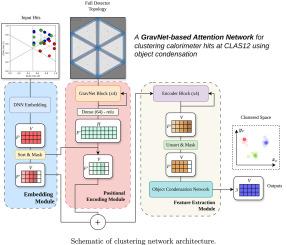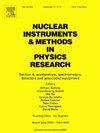人工智能辅助的物体凝结聚类用于CLAS12的量热仪阵雨重建
IF 1.4
3区 物理与天体物理
Q3 INSTRUMENTS & INSTRUMENTATION
Nuclear Instruments & Methods in Physics Research Section A-accelerators Spectrometers Detectors and Associated Equipment
Pub Date : 2025-09-12
DOI:10.1016/j.nima.2025.170990
引用次数: 0
摘要
使用CLAS12探测器的一些核物理研究依赖于其前角量热计系统对中子和光子的精确重建。由于现有的量热计重建软件产生了过多的假簇,因此在测量中性粒子时,这些研究通常会进行限制性切割。在这项工作中,我们提出了一种新的基于对象凝聚框架的class12量热计命中聚类人工智能方法。该模型使用GravNet层学习完整探测器拓扑的潜在表示,作为由Transformer编码器处理的事件量热计命中的位置编码。这种独特的结构使模型能够将本地和远程信息上下文化,从而提高其性能。在100万个模拟的e - +p碰撞事件中,我们的方法显著提高了簇的可信度:可靠的中子簇的比例从8.88%增加到30.73%,光子簇的比例从51.07%增加到64.73%。我们的研究也标志着人工智能聚类技术在hodoscopic检测器上的首次应用,显示出在许多其他实验中使用的潜力。本文章由计算机程序翻译,如有差异,请以英文原文为准。

AI-assisted object condensation clustering for calorimeter shower reconstruction at CLAS12
Several nuclear physics studies using the CLAS12 detector rely on the accurate reconstruction of neutrons and photons from its forward angle calorimeter system. These studies often place restrictive cuts when measuring neutral particles due to an overabundance of false clusters created by the existing calorimeter reconstruction software. In this work, we present a new AI approach to clustering CLAS12 calorimeter hits based on the object condensation framework. The model learns a latent representation of the full detector topology using GravNet layers, serving as the positional encoding for an event’s calorimeter hits which are processed by a Transformer encoder. This unique structure allows the model to contextualize local and long range information, improving its performance. Evaluated on one million simulated collision events, our method significantly improves cluster trustworthiness: the fraction of reliable neutron clusters, increasing from 8.88% to 30.73%, and photon clusters, increasing from 51.07% to 64.73%. Our study also marks the first application of AI clustering techniques for hodoscopic detectors, showing potential for usage in many other experiments.
求助全文
通过发布文献求助,成功后即可免费获取论文全文。
去求助
来源期刊
CiteScore
3.20
自引率
21.40%
发文量
787
审稿时长
1 months
期刊介绍:
Section A of Nuclear Instruments and Methods in Physics Research publishes papers on design, manufacturing and performance of scientific instruments with an emphasis on large scale facilities. This includes the development of particle accelerators, ion sources, beam transport systems and target arrangements as well as the use of secondary phenomena such as synchrotron radiation and free electron lasers. It also includes all types of instrumentation for the detection and spectrometry of radiations from high energy processes and nuclear decays, as well as instrumentation for experiments at nuclear reactors. Specialized electronics for nuclear and other types of spectrometry as well as computerization of measurements and control systems in this area also find their place in the A section.
Theoretical as well as experimental papers are accepted.

 求助内容:
求助内容: 应助结果提醒方式:
应助结果提醒方式:


